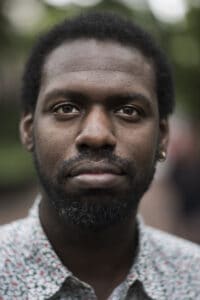
Anthony Mordechai Tzvi Russell
photo courtesy of Adam Wiseman
“Jews and African Americans making music together is the bedrock of American music…”
Anthony Mordechai Tzvi Russell, an award-winning American singer and musician specializing in Yiddish song, has created remarkable music influenced by very diverse traditions—Yiddish art songs, African American Spirituals, Hasidic melodies, folk songs from the African American South, and more.
Anthony was born in 1980 in Fort Worth Texas to a Christian family. He discovered a love for music early on and was encouraged by his mother who was a classical pianist. As a teenager, Russell won a youth choral contest in Vallejo with a prize of $500. That seemed like a fortune at the time, and he felt he was on his way, concentrating on opera. After earning a degree in music from Holy Names University he began his operatic career, making his professional operatic debut in the world premiere of Philip Glass’s Appomattox with the San Francisco Opera Company.
After years of performing, Russell started to feel constrained. That is when he discovered the work of Sidor Belarsky, a Jewish singer born in Ukraine, and fell in love with Yiddish music. “I decided opera wasn’t for me because it wasn’t giving me the kind of interpretive possibilities I wanted,” he said. “The obligation of an opera singer is to express the composer’s ideas, not the singer’s ideas. When I encountered Yiddish music, it allowed me to do more interpreting.” Encouraged by his husband, Rabbi Michael Rothbaum, who he had met in 2007, Anthony shifted his focus from opera to Yiddish music, went to synagogue, and started singing the music there. Russell decided to convert to Judaism in 2011. It was a decision he came to on his own, without pressure from his husband, he says. “I had a strong connection to Torah,” he said. “I grew up in a very religious family that was very strong in biblical literacy, so I was very well versed in the Torah, the first five books of the Bible. There were people who were surprised at my ability to sing the melodies Jews pray to. I suddenly remembered that as an opera singer there were two things I was able to do well—sing a language idiomatically and learn melodies really quickly.”
After studying on his own for a while, Russell went to Tel Aviv University for its Yiddish language program. Israel isn’t the usual destination for people studying the language. “If you ever want to hear a Tel Aviv cab driver laugh like you’ve never heard, tell him you came to Tel Aviv to study Yiddish,” he said.
Anthony’s work in traditional Ashkenazi Jewish musical forms led to a musical exploration of his own roots through the research, arrangement, and performance of a hundred years of African American roots music. Spirituals and Jewish music have a lot in common, Russell says, with lullabies, anthems, and songs with a social justice slant. He decided to take elements of each type of music and combine them. At first, he was only performing these as encores. Then he met the klezmer trio Veretski Pass at a music festival in Toronto and singing with instruments like a fiddle and an accordion made all the difference. In 2018, Veretski Pass and Anthony created the album Convergence.
In 2017, Anthony teamed up with accordionist and pianist Dmitri Gaskin to win the Concorso Internacional de Canciones en Idish (Der Idisher Idol) in Mexico City, eventually forming a duo, Tsvey Brider (“Two Brothers”), for the composition and performance of new songs in the Yiddish language. Over the past several years, Tsvey Brider has been featured in Berlin’s Radical Jewish Culture Festival, toured Poland, and performed for culture and music festivals all over the United States.
Anthony’s work in Jewish music has brought him to stages in Toronto, Montreal, Los Angeles, Philadelphia, Boston, Miami, New York, Tel Aviv, London, Berlin, Warsaw and Krakow, Symphony Space in New York City and the Kennedy Center in Washington DC, as well as Limmud Fests across the United States and Europe. The Times of Israel has described him as “A Jew by choice, an opera singer by training, and a Yiddish singer by calling.”
